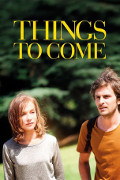
Directed by
Mia Hansen-Love
100 minutes
Rated PG
Reviewed by
Bernard Hemingway

Things To Come
Synopsis: A middle-aged philosophy professor Nathalie Chazeaux (Isabelle Huppert) finds her life undergoing unexpected changes, .Insofar as Things To Come portrays the everyday life of a modern-day woman, writer-director Mia Hansen-Løve’s latest film is a close relative of Kelly Reichardt’s currently screening, Certain Women. But this is a French film and only the French would open with a reference to late 18th/early 19th century Romantic writer, François-René de Chateaubriand, and close with one to Jean-Jacques Rousseau. Along the way the story is peppered with references to Foucault, Schopenhauer and the Frankfurt school (Ms. Hansen-Løve studied German philosophy), allusions which form a kind of highbrow backdrop for a story of life’s apparently inevitable disappointments
As for the story itself, Nathalie struggles with her “crazy” mother (Édith Scob) who eventually dies, her husband (André Marcon) leaves her for another woman, her publishers are pushing her out of their catalogue, she toys with an attachment to a former student who is not interested and her daughter might be suffering from post-natal depression. I’m not sure what the title of the film, which in French is “L’Avenir “ or “The Future”, signifies but if it refers to the lot of a modern middle-aged woman, the outlook is not promising. In this respect Nathalie has much in common with Laura Dern’s character in Reichardt’s film. .
Only too, would the French package their misery so charmingly. Hansen-Løve chooses a mix of sun-lit Parisian streets (a prominent feature of the director’s 2009 film, Father Of My Children), Nathalie’s book-lined apartment and trips to the pleasing countryside around Grenoble. There are no really dramatic moments but rather the film, which covers quite a bit of narrative territory, advances in short episodes that simply observe Nathalie as she deals with the daily trials that are her lot.
Whether this is enough to go on will depend very much on the viewer (non-French speakers will have considerable dependence on the sub-titles) but Huppert is, as always, compelling in her role (there a droll reference to France’s other leading actress, Juliette Binoche) in what is a skilfully understated character study.

Want more about this film?


Want something different?




